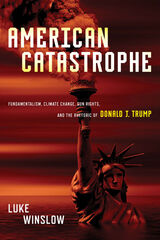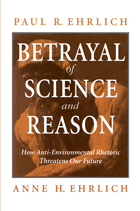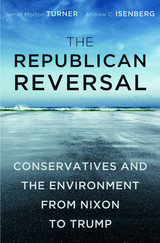
Luke Winslow introduces the rhetorical homology as a critical tool useful for understanding how catastrophic appeals unite Americans across disparate religious, ecological, cultural, and political spheres. More specifically, the four case study chapters examining Christian fundamentalism, anti-environmentalism, gun rights messaging, and the administration of Donald Trump reveal a consistent formal pattern oriented toward catastrophe. In teasing out this orientation toward catastrophe, Winslow offers a fresh, provocative, and insightful contribution to our most pressing social challenges.

Despite widespread public support for environmental protection, a backlash against environmental policies is developing. Fueled by outright distortions of fact and disregard for the methodology of science, this backlash appears as an outpouring of seemingly authoritative opinions by so-called experts in books, articles, and appearances on television and radio that greatly distort what is or is not known by environmental scientists. Through relentless repetition, the flood of anti-environmental sentiment has acquired an unfortunate aura of credibility, and is now threatening to undermine thirty years of progress in defining, understanding, and seeking solutions to global environmental problems.
In this hard-hitting and timely book, world-renowned scientists and writers Paul R. Ehrlich and Anne H. Ehrlich speak out against what they call the "brownlash." Brownlash rhetoric, created by public relations spokespersons and a few dissident scientists, is a deliberate misstatement of scientific findings designed to support an anti-environmental world view and political agenda. As such, it is deeply disturbing to environmental scientists across the country. The agenda of brownlash proponents is rarely revealed, and the confusion and distraction its rhetoric creates among policymakers and the public prolong an already difficult search for realistic and equitable solutions to global environmental problems.
In Betrayal of Science and Reason, the Ehrlichs explain clearly and with scientific objectivity the empirical findings behind environmental issues including population growth, desertification, food production, global warming, ozone depletion, acid rain, and biodiversity loss. They systematically debunk revisionist "truths" such as:
- population growth does not cause environmental damage, and may even be beneficial
- humanity is on the verge of abolishing hunger; food scarcity is a local or regional problem and is not indicative of overpopulation
- there is no extinction crisis
- natural resources are superabundant, if not infinite
- global warming and acid rain are not serious threats to humanity
- stratospheric ozone depletion is a hoax
- risks posed by toxic substances are vastly exaggerated
Betrayal of Science and Reason is an eye-opening look at current environmental problems and the fundamental importance of the scientific process in solving them. It presents unique insight into the sources and implications of anti-environmental rhetoric, and provides readers with a valuable means of understanding and refuting the feel-good fables that constitute the brownlash.

Not long ago, Republicans could take pride in their party’s tradition of environmental leadership. In the late 1960s and early 1970s, the GOP helped to create the Environmental Protection Agency, extend the Clean Air Act, and protect endangered species. Today, as Republicans denounce climate change as a “hoax” and seek to dismantle the environmental regulatory state they worked to build, we are left to wonder: What happened?
In The Republican Reversal, James Morton Turner and Andrew C. Isenberg show that the party’s transformation began in the late 1970s, with the emergence of a new alliance of pro-business, libertarian, and anti-federalist voters. This coalition came about through a concerted effort by politicians and business leaders, abetted by intellectuals and policy experts, to link the commercial interests of big corporate donors with states’-rights activism and Main Street regulatory distrust. Fiscal conservatives embraced cost-benefit analysis to counter earlier models of environmental policy making, and business tycoons funded think tanks to denounce federal environmental regulation as economically harmful, constitutionally suspect, and unchristian, thereby appealing to evangelical views of man’s God-given dominion of the Earth.
As Turner and Isenberg make clear, the conservative abdication of environmental concern stands out as one of the most profound turnabouts in modern American political history, critical to our understanding of the GOP’s modern success. The Republican reversal on the environment is emblematic of an unwavering faith in the market, skepticism of scientific and technocratic elites, and belief in American exceptionalism that have become the party’s distinguishing characteristics.

Wars over natural resources have been fiercely fought in the Humboldt Bay redwood region of Northern California, a situation made devastatingly urgent in recent decades of timber war that raised questions of economic sustainability and ecological preservation. In Trouble in the Forest, Richard Widick narrates the long and bloody history of this hostility and demonstrates how it exemplifies the key contemporary challenge facing the modern societies-the collision of capitalism, ecology, and social justice.
An innovative blend of social history, cultural theory, and ethnography, Trouble in the Forest traces the origins of the redwood conflict to the same engines of modernity that drove the region's colonial violence against American Indians and its labor struggles during the industrial revolution. Widick describes in vivid detail the infamous fight that ensued when Maxxam Inc. started clearing ancient forests in Humboldt after acquiring the Pacific Lumber Company in 1985, but he also reaches further back and investigates the local Indian clashes and labor troubles that set the conditions of the timber wars. Seizing on public flash points of each confrontation-including the massacre of Wiyot on Indian Island in 1860, the machine-gunning of redwood strikers by police and company thugs during the great lumber strike of 1935, and the car bombing of forest defenders in 1990-Widick maps how the landscape has registered the impact of this epochal struggle, and how the timber wars embody the forces of market capitalism, free speech, and liberal government.
Showing how events such as an Indian massacre and the death of a protester at the hands of a logger create the social memory and culture of timber production and environmental resistance now emblematic of Northern California's redwood region, Trouble in the Forest ultimately argues that the modern social imaginary produced a perpetual conflict over property that fueled the timber wars as it pushed toward the western frontier: first property in land, then in labor, and now in environment.
READERS
Browse our collection.
PUBLISHERS
See BiblioVault's publisher services.
STUDENT SERVICES
Files for college accessibility offices.
UChicago Accessibility Resources
home | accessibility | search | about | contact us
BiblioVault ® 2001 - 2024
The University of Chicago Press









